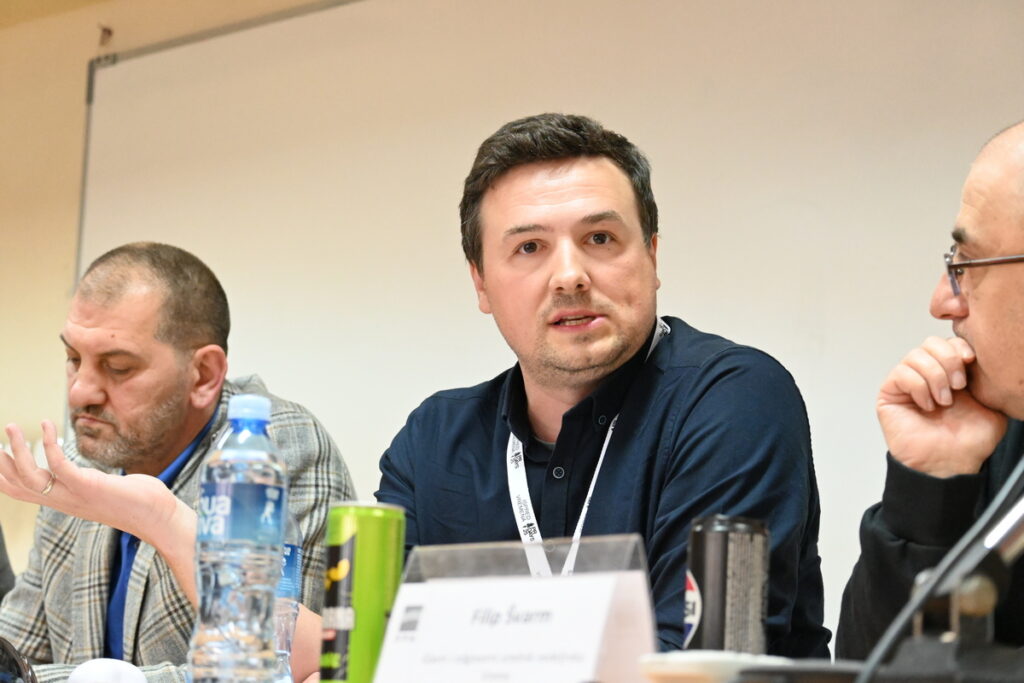A Regime on the Defensive as Pressure Builds from Within and Abroad

POLITICAL INTERVIEW
by Dragan Nikolić
Dejan Bursać
Political Scientist, Senior Research Fellow at the Institute for Philosophy and Social Theory
Political scientist Dejan Bursać, Senior Research Fellow at the Institute for Philosophy and Social Theory (IFDT), doesn’t mince words: Serbia’s political arena is broken, its institutions hollowed out, and its ruling party terrified of the ballot box. In this interview, he dissects the crisis, explains why the streets have become the last arena for politics, and warns about what might come next.
When you shut down every institutional channel for politics, it spills onto the streets
How can society fight for the democratisation of political processes when institutions have collapsed and power is highly centralised?
In the only way it is fighting now – on the streets. And for such a state of affairs in our society, SNS is absolutely to blame. When you dismantle every social institution: from parliament; through elections at practically every level – from national to local and even the most seemingly insignificant ones, for local communities; through the judiciary; to the media and even civil society organisations – when you shut down or strip of meaning every channel where politics is supposed to be conducted and where opposition or at least alternative voices should be heard, politics inevitably spills over to where it still can – onto the streets. This is particularly the case in moments of crisis, when those collapsed institutions fail, and society demands a response or reaction from them.
What are the potential turning points in the coming period? How do you forecast the further course of events, first and foremost, the actions of students and citizens, and then the response of the authorities?
The biggest and only remaining turning point is snap elections. That is why the authorities are avoiding them, on very weak pretexts. Bear in mind, we are talking about a ruling party that has gone to snap parliamentary elections four times in the past 13 years (2014, 2016, 2022, and 2023), and not once did they have a valid reason: their majority was never threatened, nor was there an imminent social crisis that could have endangered their hold on power. All four times were so-called opportunistic elections, when the ruling party judged that the opposition was in disarray and that it was the right moment to capitalise on its popularity and extend its rule for another four years.
Now, however, elections are being avoided despite all the advantages the ruling party enjoys in the electoral arena: from almost total media dominance, through unlimited financial resources, to the misuse of virtually all state institutions, which, in principle, should act as neutral arbiters in political competition, but in our case openly work for a single party. Even in such circumstances, SNS is still avoiding elections – because they are well aware that they may be the very point of complete reversal. The only question is how long they will be able to avoid them, as pressure mounts – from the protest movement, from SNS voters who cannot understand why the party is not going to the polls, and gradually from the international actors who want this situation to be resolved institutionally.

Recent personnel changes in certain police units appear to be an attempt to consolidate control over the police. How do you see the police’s attitude towards the protests, and how autonomous is it in such situations?
It is absolutely not autonomous – it has been placed in the service of the ruling party. And it has badly discredited itself throughout this entire period. Restoring public trust in the police will be a painstaking and lengthy process once this is over. It will undoubtedly require cuts and reforms that this society unfortunately failed to make back in 2000. This time it must not fail.
Is the introduction of a state of emergency a realistic option, and can the current situation already be described as a kind of “informal” state of emergency?
You are right – we are indeed in a kind of informal state of emergency, at least in the sense that the legally guaranteed human rights of certain parts of the population (opponents of the regime) have been suspended. On the other hand, the primary purpose of introducing a state of emergency in our constitutional framework is to temporarily transfer decision-making power to the executive, allowing for more efficient decision-making during times of crisis. In our political practice, where power is informally (and unconstitutionally) almost entirely concentrated in the hands of the President of the Republic, formally declaring a state of emergency would be a redundant move.
If the polls were truly in their favour, they would have called elections long ago
How much influence does the international community have on the government’s decision not to introduce a state of emergency, and how do you assess the position of foreign actors towards the protests and the regime’s response?
Over the years, Aleksandar Vučić’s regime has developed a transactional relationship with key external actors, delivering to each of them what they want to receive. It tells them what they want to hear, mostly concerning the geopolitical or economic interests of those powers in our region. In return, the regime received blank cheque support. However, in that tacit agreement – at least as far as Western countries are concerned – there is a clause: the regime must at least act in principle as a democracy. That means holding regular elections, which may not be fair but are at least free, and maintaining some form of rule of law, which includes respect for human rights. Deviations from these principles – such as problems in the electoral process, restrictions on media freedom, or widespread corruption – were largely ignored and treated as isolated incidents (even though it was clear they were part of the SNS’s style of governance), as long as the country was governed in a way that appeared, at least formally, democratic and lawful.
It is now obvious that we no longer have that. The recent debate in the European Parliament clearly shows that even the SNS’s allies, such as the European People’s Party group, can no longer remain silent in the face of the violence carried out by Vučić’s regime. Since I am sceptical about the regime’s willingness to de-escalate the situation, I believe that external pressure will only increase. It may not yet imply a complete shift in Western policy, but it is definitely a sign of a changing attitude towards Vučić – and that, at least, is a beginning.
What are the key challenges for opposition politics at a time when the protests are entirely civic and student-led, without formal leadership? Can the opposition even capitalise on this wave of dissent?
The opposition parties are in a truly unenviable position. In situations of high polarisation, such as ours, a third actor trying to find its place between two clashing and clearly defined sides usually fares poorly. We ourselves witnessed this in 2000, when third-party candidates performed poorly in the tense contest between Koštunica and Milošević. On the other hand, I believe it is entirely legitimate for the opposition to seek its place in this new context and to announce its participation in the elections.
However, we must be aware that when we refer to “the opposition,” we are not talking about a single, homogeneous entity, but rather potentially four, five, or six different actors. Such a fragmented electoral run would, in fact, leave some of those lists (and votes) below the threshold. The question is therefore whether the opposition can go into elections in a way and in formations that meaningfully contribute to maximising the votes of the regime’s opponents, bringing about a change of power and, consequently, the democratisation of the country. If it cannot, the harm outweighs the benefit. I think it would then be wiser to do what several opposition actors have already announced – to sit out the upcoming elections, support the student list, and reposition themselves in a new democratic situation after the fall of the regime, when political action will be much easier for them than it is now in the closed and repressive system we currently have.
What are the biggest challenges for SNS and SPS at this moment, especially in light of reports of falling popularity? Can we trust the polls promoted by the government, or is the decline in popularity genuinely evident?
It seems to me that the polls disseminated by the government through friendly media contain the usual methodological traps designed to make the ruling parties’ results look better than they actually are. The biggest deception is definitely the fact that, under some strange pretexts, they do not measure the rating of the student list, even though it is clear that this actor has been setting the tone of social dynamics for the past ten months and has announced its participation in the elections. Taking that approach into account, and bearing in mind that the publication of such polls obviously serves a political purpose – to reassure their own voters and confuse opposition voters – I still tend to trust some independent pollsters, who give the student list an edge over the united ruling parties. After all, I would stress once again that if the polls were really favourable for SNS, they would have called snap elections a long time ago.
Incidentally, SPS is one of the bigger casualties of these processes – albeit entirely through its own fault. When you become merely an appendage of the ruling party, with no identity or independent policy of your own, and that ruling party polarises the political scene to the maximum, your voters no longer see a reason to support you. I would say that unless the Socialists change course soon – both in terms of personnel and their relationship with SNS – they are sliding towards complete political irrelevance.
Overall, the decline in popularity of the ruling coalition in Serbia is indeed evident. There has been a partial outflow of voters, as well as fear and confusion among a much larger segment of regime voters. SNS is now trying to stop this through so-called economic measures and by organising its own rallies across towns and cities in Serbia. On the other hand, there has been absolute mobilisation of regime opponents – in this case, the student movement and its potential electoral list – supported by right-leaning voters, liberal and pro-European voters, a small percentage of former regime supporters, and most importantly, a significant number of abstainers. These include both young people who were previously uninterested in politics and former voters of democratic parties who are disillusioned with the political process. The student movement has now awakened a new sense of hope in all of them – and SNS does not know how to counter that.